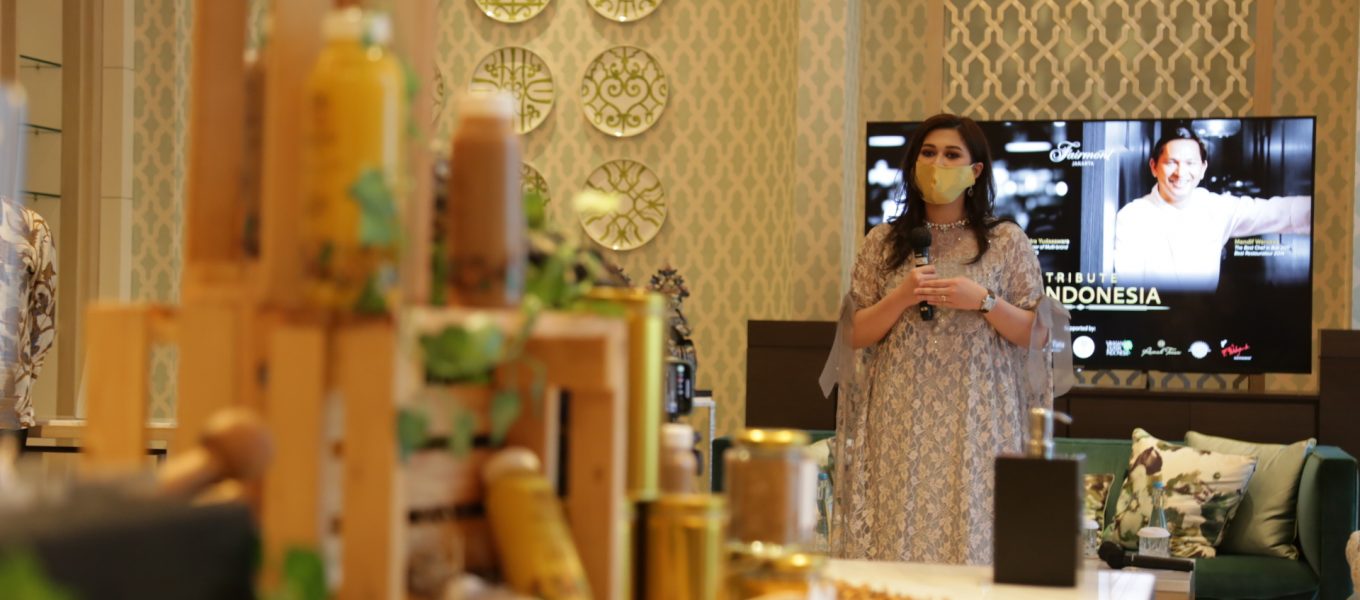Jamu – Wellness tourism according to the Global Wellness Institute (GWI) can be defined as travel related to maintaining or improving one’s best condition.
In Indonesia itself, herbal medicine took part as a means of promoting wellness tourism.
Director of Business Development and Innovation Mustika Ratu Kusuma Ida Anjani said jamu is often used in cultural activities and plays an important role in wellness tourism.
Read Also: Mustika Ratu Appointed as Official MakeUp Paskibraka 2022
The Global wellness economy is now based on GWI data of 4.5 trillion US dollars (Rp66.7 trillion) and one of the top contributors is preventive and personalized medicine and public health as well as traditional and complementary medicine.
“Then, there is also the category of healthy eating nutrition and weight loss, herbs can enter into that category. If we look at the category of Global Wellness Economy in the world of traditional or herbal medicine has become a major contributor to the economy,” said Ajeng, as she is familiarly called, when contacted Liputan6.com, Tuesday, September 6, 2022.
Ajeng continued jamu can provide a special attraction for wellness tourism considering storytelling in Indonesia is so great. She said that the country has the second largest biodiversity in the world.
Read Also: Mustika Ratu Present Puteri Indonesia Processing Herb Into a Cake
“There are so many medicinal plants in Indonesia. We are very rich in cultural diversity, ” said Ajeng. She added, ” If we explore more storytelling about herbal medicine to be able to impact and attract in wellness tourism.
Jamu itself is a derivative of the word ‘jampi’ ‘oesodo’, namely medicine and prayer, so every in the manufacture of herbal medicine there is a prayer ritual as well.” Ajeng said storytelling about herbal medicine is not only appointed as a habit and lifestyle.
Jamu will also be very interesting to be the center of tourism, both within the country and also from abroad.
“Mustika Ratu has herbal medicine to maintain health and become a lifestyle.
Read Also: IWTCF 2022- Mustika Ratu’s Opportunity Bring Product Globally
There are herbs that are packaged in ready-to-drink packaging and have a variant of tamarind turmeric, kencur rice, and tamarind sugar. Jamu Ready to Drink even exported to Japan recently, ” she said.
His party wants to introduce herbal medicine to the younger generation to break the stigma that herbal medicine tastes bitter and seems old-fashioned. For that, we want to introduce the brand Jejamu by Mustika Ratu.
“We make Curcuma latte and other beverages with a fairly unique color, natural color of natural ingredients. There is also a herbal blend of lychee and Telang flowers, which can be accepted by the younger generation, ” added Ajeng.
Another approach is to introduce herbal medicine into hotels. Ajeng explained that his party had collaborated with one of the five-star hotels in Jakarta, the Fairmont Hotel.
Read Also: Mustika Ratu Receives Asia Africa Business Award 2022 from AACC
“When 17 August, at the hotel cafe prepared a variety of flavors including Curcuma Latte, coco pandan latte, and red ginger lemongrass.
Presented in such a way that herbal medicine is not only found on the street but can be integrated into the wellness tourism ecosystem even in five-star hotels,” said Ajeng.
Another collaboration between Mustika Ratu is with Sheraton chefs which were presented at the International Wellness Tourism Conference and Festival or IWTCF 2022.
They serve a pie made from Kaempferia galanga rice. Smoothies containing sour turmeric mixed fruits.
Read Also: Global Halal Hub with MRAT Cooperate to Assist Indonesian MSMEs Goes Global
Curry cooked with sour turmeric becomes the next treat. “We want to introduce herbal medicine through wellness tourism because tourism people want to enjoy the holidays.
While the holidays want to maintain health, healing, maintain mind body and soul, herbal medicine is one important part of it,” said Ajeng.
In wellness tourism, herbal medicine becomes a complement to the ecosystem of services. As well as in the spa that also uses spices native to Indonesia.
Mustika Ratu has a spa that uses scrubs from herbal spices, the sari is used for drinking, and pulp can be used as a scrub. In the factory there is already waste management, there is fertilizer, and others. The impact on the environment we have also thought about” said Ajeng.
Read Also: G20 Delegation Arrived At Solo and Treated Herbal Drink by Mustika Ratu
Spa becomes one of the elements in the wellness economy, namely personal care and beauty. The role of herbal medicine in the running of the spa is certainly very important.
Guests are invited to pray in advance before entering the spa location. The treatment is continued with spices, namely scrubs from turmeric, masks from jicama, and baths with spices such as ginger, cinnamon, to sandalwood.
“The fragrance is exotic for people from outside who vacation in Indonesia where it is not found abroad.
After treatment, we serve herbal medicine, give a holistic wellness tourism package from the outside and facial skincare from the inside there is herbal medicine, ” explained Ajeng.
Read Also: Exports to Japan, Jamu Mustika Ratu Gives Nation Pride
Deputy for Digital Economy and creative products of the Ministry of Tourism and Creative Economy (Kemenparekraf) Muhammad Neil El Himam revealed that a healthy lifestyle is becoming a daily trend in the world community.
Not a few also realize that wellness is one of the transformative efforts. From an unqualified or unwell condition into a quality life or well-being life.
“Indonesia has great potential in plants that can be a medicine. Of the world’s 40 thousand medicinal plants, most are found in Indonesia.
Read Also: Puskesmas Expo, MRAT Brought Featured Product
There are as many as 1,600 types of medicinal plants that have the potential to become herb products,” Niel said in an online talk, some time ago.
Data from the Ministry of industry in 2020, domestic herbal medicine sales reached Rp20 trillion and abroad worth Rp16 trillion. This accounts for two percent of the world’s herbal consumption.
“Indonesia is a spa destination that ranks 17th in the world in the Top 20 markets with spa revenue in 2020 reaching the US $ 1 billion.
This condition is an opportunity as well as an important momentum for the Kemenparekraf to encourage quality tourism,” he added.***


